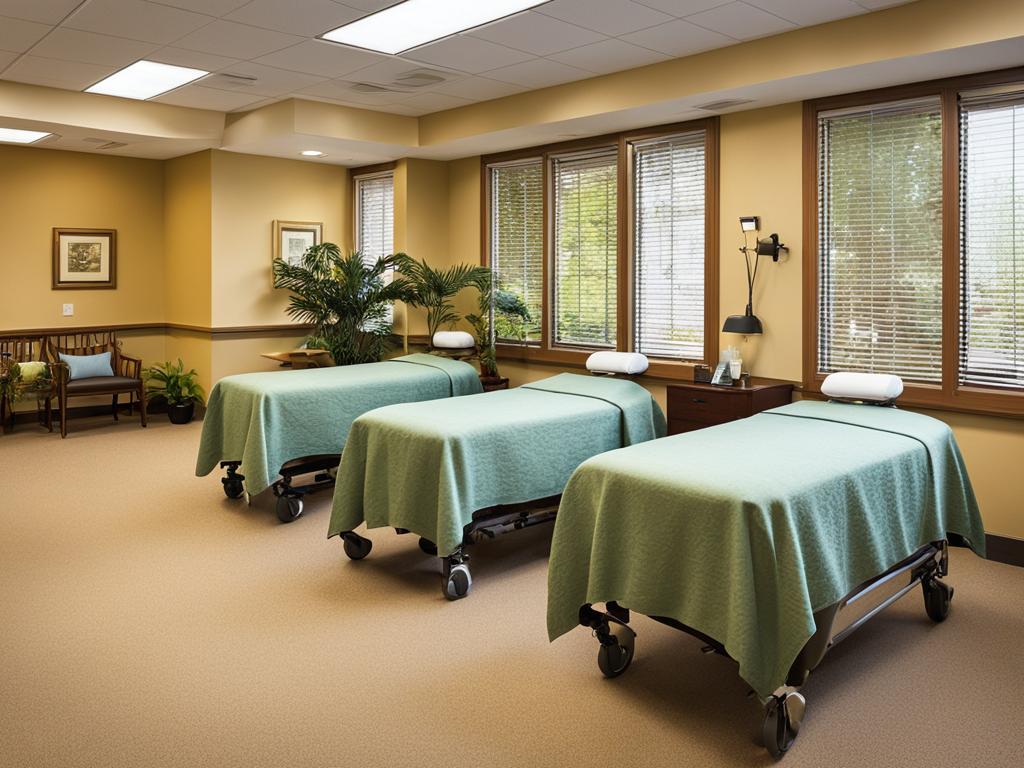Transition Timing: From Assisted Living to Nursing Home
Moving from assisted living to a nursing home is a significant decision that requires careful consideration. There are various factors to consider, such as the level of care needed and changes in medical conditions. Understanding when it is the right time to make this transition is essential for ensuring the well-being and appropriate care of your loved one.
Key Takeaways:
- Transitioning from assisted living to a nursing home involves considering factors like the level of care needed and changes in medical conditions.
- Signs that may indicate it’s time to move to a nursing home include the need for 24-hour care, complex medical conditions, and the requirement for hospice or palliative care.
- Nursing homes can provide round-the-clock medical care, specialized medical attention, and assistance with mobility for seniors who are bedridden or require a wheelchair.
- Frequent hospital visits, falling incidents, and the need for medication administration can also be signs that a nursing home may be more suitable.
- Financial considerations, such as government assistance programs like Medicaid and Medicare, can help with the cost of nursing home care.
Signs to Consider Moving from Assisted Living to Nursing Home
When it comes to moving from assisted living to a nursing home, there are several signs that indicate it may be time for this transition. It is important to consider these signs and factors to ensure the appropriate level of care for your loved one. The following are key signs to watch out for:
- Need for 24-hour care: If your loved one requires round-the-clock care and assistance with daily activities, it may be an indication that the level of care provided in assisted living is no longer sufficient.
- Complex medical conditions: Developing complex medical conditions that require ongoing specialized care often indicate the need for a nursing home. These conditions may include chronic diseases, neurological disorders, or conditions that require regular medical attention and monitoring.
- Requiring hospice or palliative care: If your loved one has a terminal illness and requires specialized end-of-life care, a nursing home that offers hospice or palliative care services may be the best option.
- Becoming bedridden or needing a wheelchair: If your loved one becomes bedridden or relies on a wheelchair for mobility, a nursing home can provide the necessary assistance and resources to ensure their comfort and safety.
- Frequent visits to the hospital: Seniors who make frequent trips to the hospital, even for non-emergency issues, may benefit from the comprehensive care and rehabilitation services available in a nursing home setting.
- Falling more often: Increased instances of falls can be a sign that the level of care provided in assisted living is inadequate to meet your loved one’s needs. Nursing homes have trained staff who are experienced in fall prevention and can provide immediate medical attention if necessary.
- Needing medication administration: When a senior requires assistance with medication administration, a nursing home with licensed caregivers who can provide this service may be more suitable than assisted living.
- Wanting help with the cost of living: If your loved one needs financial assistance to cover the costs of care, nursing homes may offer government assistance programs or payment plans to help make the cost more manageable.
By evaluating these signs, you can determine whether moving to a nursing home is the right choice for your loved one’s well-being and quality of life. It is essential to consider their specific needs and consult with healthcare professionals to make an informed decision.
Needing 24-Hour Care
When a senior requires **round-the-clock care** that goes beyond minor assistance, it may indicate a need to transition to a nursing home. Assisted living communities typically provide support for activities of daily living (ADLs) but may not have the resources to provide extensive medical care.
Nursing homes, on the other hand, have staff that includes **licensed practical nurses, registered nurses, and aides** who can provide **24/7 medical care**. This higher level of care includes services such as IV therapy, catheter placement and maintenance, blood pressure monitoring, and respiratory therapy.
| Assisted Living | Nursing Home |
|---|---|
| Support for ADLs | 24/7 medical care |
| Minor medical assistance | Extensive medical care |
| Limited resources | Licensed nurses and aides |
With a dedicated team of medical professionals available day and night, nursing homes can provide the necessary care and attention for seniors needing continuous support.

Image: 24-Hour Care: When a senior requires round-the-clock care, transitioning to a nursing home may be necessary.
Developing Complex Medical Conditions
When seniors develop complex medical conditions that require ongoing medical attention, it may be a sign that the care provided in assisted living is no longer sufficient. Conditions such as diabetes, Parkinson’s disease, Huntington’s disease, and multiple sclerosis often require specialized medical care and assistance.
Nursing homes have the resources and staff trained to address these complex medical needs, including medication management, additional assistance, and access to specialized equipment. For seniors with Alzheimer’s disease and other types of dementia, there are also nursing homes and memory care facilities specifically designed to cater to their needs.
By transitioning to a nursing home, seniors with complex medical conditions can receive the specialized care they require, ensuring their health and well-being are prioritized.
Specialized Care for Complex Medical Needs
Seniors with complex medical conditions often require specialized care that goes beyond the scope of assisted living. Nursing homes have the resources and expertise to provide the following:
- Medication Management: Nursing home staff is trained in administering and managing complex medication regimens, ensuring seniors receive the appropriate doses at the right times.
- Additional Assistance: Specialized care providers in nursing homes are equipped to provide assistance with activities of daily living (ADLs), such as bathing, dressing, and eating, for seniors who may struggle due to their medical conditions.
- Access to Specialized Equipment: Nursing homes are equipped with specialized medical equipment, such as oxygen tanks, mobility aids, and monitoring devices, to support seniors with complex medical conditions.
The specialized care available in nursing homes ensures that seniors with complex medical needs receive the attention and support required to manage their conditions effectively.
Requiring Hospice or Palliative Care
In certain situations where seniors have a terminal illness and choose not to undergo further treatments, hospice care or palliative care may be appropriate. Nursing homes typically offer both types of care, focusing on providing comfort and addressing underlying medical conditions. While some assisted living communities may collaborate with a hospice team, not all of them have that option. If a senior requires specialized end-of-life care, transitioning to a nursing home with hospice or palliative care services may be the best choice.
Hospice care and palliative care are essential components of end-of-life care, ensuring that seniors with terminal conditions receive the necessary support and comfort during their final stages. These specialized services aim to alleviate pain, manage symptoms, and provide emotional and spiritual support to both the patients and their families.
By transitioning to a nursing home that offers hospice or palliative care, seniors can have access to a multidisciplinary team of healthcare professionals, including doctors, nurses, social workers, and counselors. This team works collaboratively to create a comprehensive care plan tailored to the individual’s needs and preferences. The focus shifts from aggressive medical interventions to providing comfort, dignity, and quality of life.
Benefits of Hospice and Palliative Care in Nursing Homes
Choosing a nursing home with hospice or palliative care services offers several advantages for seniors and their families, including:
- Comprehensive pain and symptom management
- 24/7 access to medical professionals
- Emotional and spiritual support
- Coordination of care and services
- Assistance with advance care planning and end-of-life decisions
- Bereavement services for families
Nursing homes that provide hospice or palliative care often have dedicated units or specialized staff trained in end-of-life care. These professionals understand the unique needs and concerns of patients and their families during this challenging time. They ensure that the necessary support, comfort, and assistance are provided, enabling seniors to spend their final days in a peaceful and dignified manner.
“Hospice care is the end-of-life care that focuses on managing pain and symptoms while providing emotional and spiritual support to both the patient and their family. It promotes the best possible quality of life during the terminal phase of an illness.” – American Hospice Foundation
Transitioning to a nursing home that offers hospice or palliative care can be a difficult decision, but it ensures that seniors with terminal illnesses receive the specialized care they need. With a compassionate and interdisciplinary approach to end-of-life care, nursing homes with these services aim to support both the physical and emotional well-being of the patient and their loved ones.

Becoming Bedridden or Needing a Wheelchair
If a senior has become bedridden or requires constant assistance with mobility, it may be an indication that a nursing home is more suitable than assisted living. Nursing home caregivers are experienced in patient transfers and are equipped to handle the specific needs of wheelchair users. Additionally, seniors who spend extended periods in bed may develop bedsores, and nursing home caregivers are trained in preventing and tending to these wounds.
Wheelchair Accessibility in Nursing Homes
Nursing homes prioritize wheelchair accessibility to ensure the comfort and safety of residents with mobility issues. These facilities have ramps, handrails, and wide corridors to accommodate wheelchair users. The caregivers are trained in proper transfer techniques, allowing seniors to move around the facility with ease.
Prevention and Treatment of Bedsores
Seniors who spend prolonged periods in bed due to immobility are at risk of developing bedsores, also known as pressure ulcers. Nursing homes have specialized protocols in place to prevent and manage bedsores effectively. Caregivers consistently reposition and provide necessary care to avoid the development of these painful and potentially serious wounds.
Physical and Occupational Therapy
Nursing homes often offer physical and occupational therapy services to help seniors regain mobility and independence. These therapies focus on improving strength, coordination, and balance, allowing residents to enhance their quality of life. With the guidance of qualified therapists, seniors can work towards optimal mobility and reduce their reliance on wheelchairs or become bedridden.
| Benefits of Nursing Homes for Mobility Issues | Assisted Living | Nursing Home |
|---|---|---|
| Wheelchair Accessibility | Varies, may not be fully equipped for wheelchair users | Equipped with ramps, handrails, and wide corridors |
| Prevention and Treatment of Bedsores | May have limited resources for proper care | Specialized protocols to prevent and manage bedsores effectively |
| Therapy Services | May have limited or no therapy services available | Offers physical and occupational therapy to improve mobility |
Frequent Visits to the Hospital
Seniors who make frequent trips to the hospital, even if they do not require ongoing hospitalization, may benefit from transitioning to a nursing home. Nursing homes often offer rehabilitation services and therapy options such as physical therapy, occupational therapy, speech therapy, and orthopedic rehabilitation. By receiving constant monitoring and medical care at a nursing home, seniors can reduce the number of hospital visits and minimize the risk of secondary infections, falls, and other complications.
Frequent visits to the hospital can be disruptive and stressful for seniors and their families. Transitioning to a nursing home can provide a more comprehensive and proactive approach to healthcare, with follow-up care and therapy options readily available on-site.
Follow-Up Care
After a hospital visit or a medical procedure, follow-up care plays a crucial role in ensuring a senior’s successful recovery. Nursing homes have the resources and expertise to provide consistent follow-up care, including medication management, wound care, and regular check-ups. This proactive approach to healthcare helps prevent complications and supports the senior’s overall well-being.
Therapy Options
Rehabilitation and therapy are often necessary after a hospital stay or to address ongoing health conditions. Nursing homes offer a range of therapy options to support seniors in their recovery and help them maintain or improve their physical and cognitive abilities. The therapy options available in nursing homes include:
- Physical therapy: Helps seniors regain strength, balance, and mobility through targeted exercises and interventions.
- Occupational therapy: Focuses on improving daily living skills and facilitating independence in activities such as dressing, bathing, and cooking.
- Speech therapy: Aims to enhance communication skills, address swallowing difficulties, and improve cognitive abilities related to language and memory.
- Orthopedic rehabilitation: Specialized therapy for seniors recovering from joint replacements, fractures, or other orthopedic surgeries.
These therapy options can significantly improve seniors’ quality of life and functional abilities, allowing them to regain independence and engage in activities they enjoy.

Reducing Hospital Visits, Improving Quality of Care
“Transitioning to a nursing home provides seniors with the opportunity to receive comprehensive care, reducing the need for frequent hospital visits and ensuring their well-being is prioritized. With follow-up care and therapy options available on-site, nursing homes offer a more holistic approach to healthcare.”
By transitioning to a nursing home, seniors can enjoy the benefits of continuous medical care, close monitoring, and rehabilitation services right in their living environment. This not only reduces the stress and inconvenience of frequent hospital visits but also enhances overall care and supports the senior’s health and well-being.
Falling More Often
Aging adults are at an increased risk of falls, which can have serious consequences such as injuries and other health complications. If you notice that a senior is falling more frequently, it may be indicative of underlying mobility issues and a heightened risk of falls. In such cases, it may be necessary to consider a higher level of care provided in a nursing home.
Nursing homes have caregivers who are experienced in assisting seniors with mobility issues and are equipped to handle falls effectively. They understand the importance of fall prevention and are trained to provide immediate medical care if necessary. By transitioning to a nursing home, seniors can receive the necessary support and supervision to minimize the risk of falls and ensure their overall safety and well-being.

Needing Medication Administration
Seniors who require assistance with medication administration may find that a nursing home can better meet their needs. Nursing homes have licensed caregivers who can administer medications, including injections for conditions like diabetes. While some assisted living communities may also assist with medication management, nursing homes often have more resources and staff trained specifically in medication administration.
Proper medication administration is crucial for seniors with complex medication conditions. Nursing homes employ skilled professionals who can ensure that medications are taken correctly and on time, reducing the risk of complications and adverse drug interactions. This personalized care can provide peace of mind for both seniors and their families.
Types of Medication Administration
In nursing homes, medication administration can take various forms, including:
- Oral medications: Licensed caregivers ensure that seniors take their prescribed oral medications, following the correct dosage instructions.
- Injections: Nursing homes have trained staff capable of administering injections, such as insulin for diabetes management.
- Topical medications: Skilled caregivers apply topical medications, such as ointments or creams, as directed by healthcare professionals.
- Suppositories: In cases where suppositories are prescribed, nursing home staff can provide assistance with their proper administration.
Having experienced professionals handle medication administration can be especially beneficial for seniors with complex medication conditions. These conditions may involve multiple medications, differing dosages, and specific time intervals for each medication. Nursing home staff can manage these complexities, ensuring accurate medication administration.
“With medication administration services available in nursing homes, seniors can receive their medications safely and on schedule, reducing the risk of medication errors and complications.”
Additionally, nursing homes often have robust systems in place for medication tracking and management. This includes documentation of medication administration, monitoring for adverse reactions or side effects, and timely communication with healthcare providers regarding any changes in the resident’s medication regimen.
The Importance of Medication Administration in Complex Cases
When seniors have complex medication conditions, their healthcare requires close monitoring and careful medication management. Some may have conditions that require precise timing of medication doses, specialized administration techniques, or close monitoring for potential side effects.
A nursing home’s comprehensive approach to medication administration can help address these needs. Skilled caregivers can provide the necessary support and supervision while ensuring that medications are administered safely and effectively. They also play a crucial role in identifying and communicating any concerns or changes in a senior’s medication response to the healthcare team.
By entrusting medication administration to trained professionals in a nursing home setting, seniors with complex medication conditions can receive the quality care they need to maintain their health and well-being.
Wanting Help with the Cost of Living
Nursing homes can be more expensive than assisted living communities, but there are government assistance programs available to help lessen the burden. One such program is Medicaid, which covers nursing home stays for eligible individuals. Another option is Medicare, which may provide coverage for short-term stays in nursing homes for rehabilitation purposes. It is important to explore these government assistance programs and determine whether your loved one qualifies for financial aid.
In addition to government assistance, some nursing homes offer their own payment plans or financial assistance programs. These options can help make the cost of nursing home care more manageable for families. It is advisable to inquire about these programs when researching different nursing home options.
If you are considering a nursing home for your loved one and are concerned about the cost, it is essential to understand the government assistance programs available and explore other financial aid options. By doing so, you can alleviate some of the financial burden associated with nursing home care and ensure that your loved one receives the quality care they need and deserve.

| Government Assistance Programs | Eligibility |
|---|---|
| Medicaid | Low-income individuals, meets state-specific criteria |
| Medicare | Adults aged 65 and older, certain disabilities |
Evaluating the Options for Nursing Homes
When transitioning from assisted living to a nursing home, it’s crucial to consider the different types of nursing homes available. Understanding the options will help you make an informed decision based on the specific needs of your loved one.
Skilled Nursing Facilities
A skilled nursing facility provides round-the-clock medical care and assistance with daily activities. This type of nursing home is ideal for seniors who require intensive medical attention and monitoring. Skilled nursing facilities have a team of licensed nurses and healthcare professionals who are trained to provide specialized care for complex medical conditions.
Memory Care Units
Memory care units are specifically designed for individuals with dementia or memory impairments. These units offer a safe and secure environment that focuses on providing specialized care for residents with Alzheimer’s disease or other forms of dementia. Staff members are trained to understand the unique needs of individuals with memory impairments and to provide personalized care and support.
Continuing Care Retirement Communities
A continuing care retirement community (CCRC) offers a range of living options within one community. This includes independent living, assisted living, and skilled nursing facilities. CCRCs provide a seamless transition as residents’ needs change over time. This type of nursing home allows seniors to age in place within the same community, providing comfort and familiarity.
By exploring the different types of nursing homes available, you can find the most suitable option for your loved one’s specific needs. Consider factors such as the level of medical care required, specialized services for memory impairments, and the desire for a seamless transition as needs change over time.
If you’re unsure about which type of nursing home is right for your loved one, consult with healthcare professionals, such as doctors and social workers, who can provide guidance based on the individual’s unique needs and circumstances.

Note: The image above illustrates the different types of nursing homes, including skilled nursing facilities, memory care units, and continuing care retirement communities.
Making the Decision to Move to a Nursing Home
The decision to move to a nursing home can have a significant emotional impact on both the individual and their family. It is crucial to approach this topic with sensitivity, empathy, and open communication. Involving the senior in the decision-making process as much as possible is essential, as their input and feelings should be respected and considered.
Seeking advice from professionals, such as doctors, social workers, or elder care specialists, can provide valuable guidance and support throughout the decision-making process. These experts can offer insights based on experience and help connect you with resources to ease the transition to a nursing home.
Remember that deciding to move to a nursing home does not signify a failure but rather a recognition of changing needs and a desire for additional support and care. It is a proactive step towards ensuring the well-being and appropriate care of your loved one.
Quoting Experts:
“Involving the senior in decision-making and considering their preferences is crucial for maintaining their sense of autonomy and dignity.” – Dr. Elizabeth Johnson, Geriatric Specialist
Key Considerations for the Decision-making Process:
- Open and honest communication
- Seeking advice from professionals
- Respecting the senior’s preferences and feelings
- Understanding the benefits and resources provided by nursing homes
- Evaluating the level of care needed and available in assisted living vs. nursing home
- Considering the emotional and psychological impact on the senior
| Advantages of Moving to a Nursing Home | Concerns and Challenges |
|---|---|
| – Access to 24/7 medical care and support | – Adjusting to a new environment |
| – Specialized care for complex medical conditions | – Separation from familiar surroundings and routines |
| – Availability of hospice or palliative care services | – Emotional and psychological impact of leaving home |
| – Assistance with mobility issues and wheelchair use | – Financial considerations and cost of nursing home care |
Note: The advantages and challenges listed above are not exhaustive and may vary depending on individual circumstances. It is important to consider the unique needs and preferences of the senior when making the decision to move to a nursing home.

Costs of Nursing Home Care and Funding Options
Nursing home care can be a significant financial investment, and the cost can vary based on factors such as location and the level of care required. It’s crucial to consider various funding options to ensure you can afford the care your loved one needs. Here are a few funding options to explore:
Medicare
Medicare is a federal health insurance program available to individuals aged 65 and older, as well as some younger individuals with certain disabilities. While Medicare does not typically cover long-term nursing home care, it may provide coverage for short-term stays for rehabilitation purposes. If your loved one requires nursing home care after a hospital stay or a specific medical event, Medicare may help cover the costs for a limited period.
Medicaid
Medicaid is a joint federal and state program that provides health coverage to individuals with limited income and resources. Unlike Medicare, Medicaid does cover nursing home care for eligible individuals who meet specific income and asset requirements. If your loved one qualifies for Medicaid, it can significantly assist in covering the costs of nursing home care. The eligibility criteria and coverage can vary by state, so it’s essential to research and understand the requirements in your area.
Long-Term Care Insurance
Long-term care insurance is a private insurance policy that can help cover the costs of long-term care, including nursing home care. This type of insurance typically helps with a range of services, such as skilled nursing care, personal care, and assistance with activities of daily living. The coverage and premiums can vary depending on the policy, so it’s essential to review the terms, coverage limits, and any exclusions before purchasing a policy. Long-term care insurance can provide valuable financial support to offset the expenses associated with nursing home care.
Planning and researching funding options early can help ensure you’re prepared for the costs of nursing home care when the need arises. Consider consulting with a financial advisor or eldercare specialist who can provide guidance tailored to your specific situation. It’s also important to explore any available government assistance programs and understand the eligibility requirements for financial support.

Conclusion
Deciding when to move from assisted living to a nursing home is a personal and complex decision that requires careful thought and consideration. The transition depends on an individual’s changing needs and circumstances. It is essential to evaluate various signs and factors to determine nursing home readiness.
Consider factors such as the need for 24-hour care, complex medical conditions, hospice or palliative care requirements, mobility issues, frequent hospital visits, falling incidents, medication administration needs, and financial considerations. By carefully considering these factors, you can make an informed decision that ensures the well-being and appropriate care of your loved one.
To make the transition smoother, it is important to research and evaluate different nursing home options. Involve professionals such as doctors, social workers, or elder care specialists, who can provide guidance and support throughout the decision-making process. Additionally, seek advice from loved ones and include them in the discussions to gather different perspectives and ensure everyone’s concerns are addressed.
Remember, moving from assisted living to a nursing home is not a failure but a recognition of changing needs and a desire for additional support and care. By approaching the decision with empathy, open communication, and careful consideration of all factors, you can ensure a smooth and successful transition for your loved one.
FAQ
When is the right time to move from assisted living to a nursing home?
The right time to move from assisted living to a nursing home is when a senior requires 24-hour care or medication administration, develops complex medical conditions, requires hospice or palliative care, becomes bedridden or needs a wheelchair, makes frequent visits to the hospital, falls more often, or wants help with the cost of living.
What are the signs to consider moving from assisted living to a nursing home?
The signs to consider moving from assisted living to a nursing home include needing 24-hour care, having complex medical conditions, requiring hospice or palliative care, becoming bedridden or needing a wheelchair, making frequent visits to the hospital, falling more often, needing medication administration, and wanting help with the cost of living.
What does needing 24-hour care entail?
Needing 24-hour care means requiring constant assistance and supervision for activities of daily living (ADLs) and having access to around-the-clock medical care.
How do complex medical conditions affect the decision to move to a nursing home?
Complex medical conditions often require specialized medical care and assistance that nursing homes are equipped to provide, including medication management, additional assistance, and access to specialized equipment.
What is the role of hospice or palliative care in the decision to move to a nursing home?
Nursing homes typically offer both hospice and palliative care services, focusing on providing comfort and addressing underlying medical conditions for individuals with terminal illnesses or those who choose not to undergo further treatments.
How does becoming bedridden or needing a wheelchair impact the decision to move to a nursing home?
If a senior becomes bedridden or requires constant assistance with mobility, it may indicate that the care and resources provided in a nursing home are better suited to meet their needs compared to assisted living facilities.
What advantages do nursing homes offer for individuals who make frequent visits to the hospital?
Nursing homes often provide rehabilitation services and therapy options, such as physical therapy, occupational therapy, speech therapy, and orthopedic rehabilitation, which can reduce the need for hospital visits and minimize the risk of complications.
How does falling more frequently impact the decision to move to a nursing home?
Falling more often increases the risk of injuries and other health complications. Nursing homes are equipped to handle falls and provide immediate medical care, making them more suitable for seniors with mobility issues.
Why might a senior need medication administration and how does it relate to the decision to move to a nursing home?
Seniors who require assistance with medication administration may find that nursing homes can better meet their needs. Nursing homes have licensed caregivers who can administer medications, including injections for conditions like diabetes.
Can seniors receive financial assistance for moving to a nursing home?
Yes, there are government assistance programs like Medicaid and Medicare that can help offset the cost of nursing home care. Medicaid covers nursing home stays for eligible individuals, while Medicare may cover short-term stays for rehabilitation.
What types of nursing homes are available to consider when making the transition from assisted living?
There are different types of nursing homes to consider, including skilled nursing facilities, memory care units for individuals with dementia or memory impairments, and continuing care retirement communities that offer a range of living options.
How can families approach the decision to move to a nursing home?
Families should approach the decision with sensitivity, empathy, and open communication. Involving the senior in decision-making, seeking advice from professionals like doctors and social workers, and connecting with resources can help ease the emotional impact and ensure the well-being and appropriate care of the senior.
What are the costs of nursing home care, and what funding options are available?
Nursing home care costs can vary depending on factors like location and level of care required. Funding options include Medicare, which covers short-term stays for rehabilitation, Medicaid for eligible individuals with limited income and resources, and long-term care insurance. Planning and researching funding options early can help prepare for the cost of nursing home care.
What factors should be evaluated to determine nursing home readiness?
Factors to consider when determining nursing home readiness include the need for 24-hour care, complex medical conditions, requiring hospice or palliative care, mobility issues, frequent hospital visits, falling incidents, medication administration needs, and financial considerations.

